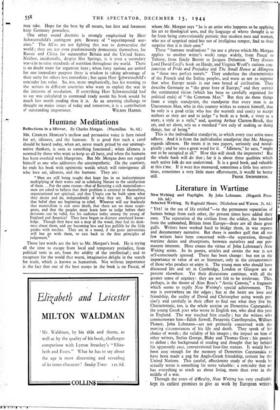Humane Meditations
Reflections in a Mirror, By Charles Morgan. (Macmillan. 8s. 6d.)
Mit. CHARLES MORGAN'S mellow and persuasive voice is here raised for art, idleness, and the humane. It is good that such a carol should be heard today, when art, never much prized by our unimagi-
native thinkers, is seen as something functional ; when idleness is scorned by those who want to keep us all busy, and when the humane has been overlaid with blueprints. But Mr. Morgan does not regard himself as one who addresses the unsympathetic. On the contrary, he ends his book with optimistic words which will reinvigorate all who love art, idleness, and the humane. They are:
"Men are still being taught that hope lies in an indiscriminate multiplying of their wants and in subduing Nature to the satisfaction of them... For the same reason—that of flattering a sick materialism— men are asked to believe that their problem is external to themselves, organisational not spiritual, and that Utopia can be built upon what they desire and do, independently of what they are. But against that belief they are beginning to rebel. Whoever will say fearlessly that materialism is sick unto death, that there are no more scape- goats, and that the peoples must learn how to judge before their decisions can be valid, has his audience today among the young of England and America? They have begun to distrust unrelated know- ledge. Though they have not a map of the wood, they feel its dark- ness about them, and are becoming less and less gullible by the little guides with torches. They are in a mood, if the great universities will but go with- them, to cast back to the first principles of judgement."
Those last words are the key to Mr. Morgan's book. He is trying all the time to escape from local and temporary prejudice, from political tests in art, from the aridity of the intellectual ; and to recapture for the world that warm, imaginative delight in the search for truth, which is known as humanism. Not without importance is the fact that one of the best essays in the book is on Pascal, of
whom Mr. Morgan says "he is an artist who happens to be applying his art to theological uses, and the language of whose thought is so far from being conventionally pietistic that modern men and women, who are of sceptical mind but not of irreligious temper, find to their surprise that it is their own."
These "humane meditations "-(to use a phrase which Mr. Morgan applies to another writer's work) range widely, from Pascal to Tolstoy, from Emily Bronte to Jacques Delamain. They discuss Lord David Cecil's book on Hardy, and Virginia Woolf's curious con- junction of Pride and Prejudice and The Small House at Allington as "those two perfect novels." They underline the characteristics of the French and the Italian peoples, and warn us not to suppose that what Europe needs is our own brand of civilisation. They describe Germany as "the great bore of Europe," and they correct the sentimental vision (which has been so carefully organised for political ends) of "the Common Man." But they do these things from a single standpoint, the standpoint that every man is an Uncommon Man, who in-this country wishes to remain himself, that he only is a good critic who has the warmth and sanity to accept authors as they are and to judge "a book as a book, a story as a story, a style as a style," and, quoting Arthur Clutton-Brock, that art, and art alone, sets us a standard "not only of making or doing things, but of being."
This is the individualist standpoint, to which every true artist must adhere. And it is from the individualist standpoint that Mr. Morgan regards idleness. He treats it in two papers, seriously and nostal- gically ; and he says a great word for it. "Idleness," he says, "ought not to be occupied at all." How this will shock the improvers! But the whole book will do that ; for it is about three qualities which such active folk do not understand. It is a good book, and valuable at this time. If it were less measured, sometimes a little less senten- tious, sometimes a very little more effervescent, it would be better


























 Previous page
Previous page